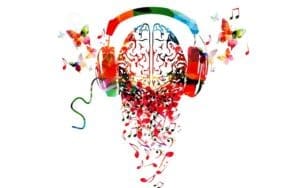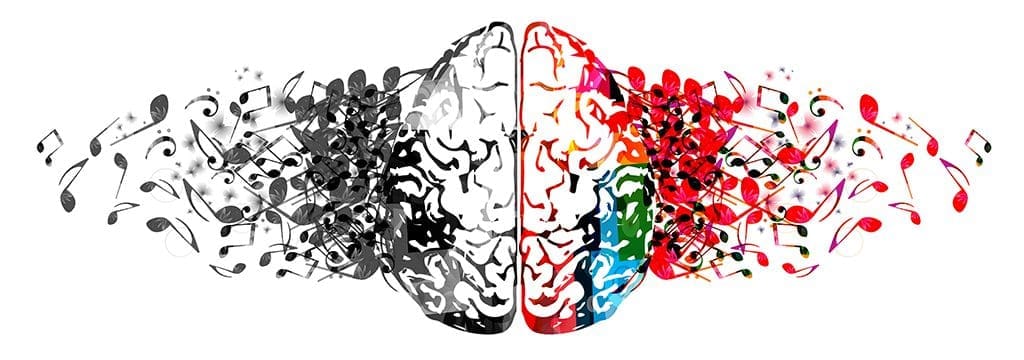Last update 5/2/2024
Studies indicate that the popular activity of learning to play a musical instrument will decrease the age-related decline in hearing for adults.
Companies that are offering brain training are doing an enormous business. Companies such as Lumosity, BrainHQ, and Cogmed are parts of a business making millions. Those businesses are growing and are expected to exceed $3 billion by 2023.
However, do their brain training programs really benefit your brain?
Apparently, some researchers do not believe that they do. The University of Illinois has decided that little or no evidence supports the claims that these games help the brain. In fact, Lumosity was reportedly fined $2 million for making false claims that games are good for the brain.
Guitar for Brain Health
So, is there any evidence to show music is good for the brain?
Studies that show that music is good for the brain
Kraus, N., & Chandrasekaran, B. (2010). Music training for the development of auditory skills. Nature Reviews Neuroscience, 11(8), 599-609.
Schlaug, G., & Zatorre, R. J. (2005). Interactions between music and speech: Implications for the design of music therapy approaches. Annals of the New York Academy of Sciences, 1060, 238-256.
Thaut, M. H. (2005). Rhythm and movement: Principles and applications. Human Kinetics.
Hughes, J. R. (2005). The neuroscience of music. Journal of the Royal Society of Medicine, 98(8), 369-375.
Levitin, D. J. (2006). This is your brain on music: The science of a human obsession. Atlantic Books.
These studies have shown that music can improve a wide range of cognitive functions in older adults, including memory, learning, creativity, language skills, and cognitive function. Music can also help reduce stress and anxiety, boost mood and well-being, and improve physical performance.
Music therapy
In addition to these studies, there is also a growing body of research on the use of music therapy for a variety of conditions, including Alzheimer’s disease, Parkinson’s disease, stroke, and autism. Music therapy has been shown to be effective in improving cognitive function, reducing behavioral problems, and improving quality of life in people with these conditions.
Overall, the scientific evidence suggests that music is very good for the brain. Listening to music can improve cognitive function, reduce stress and anxiety, boost mood and well-being, and even protect against cognitive decline. So why not put on some music and enjoy all the benefits it has to offer?
Music is a powerful force that can evoke a wide range of emotions, from joy and excitement to sadness and nostalgia. It can also profoundly impact our brains, influencing our mood, cognitive function, and even our physical health.
However, if brain games do not help brain and memory decline, what will help? There is excellent news: research shows that learning to play a musical instrument is very good for our brains.
So why does playing musical instruments help your brain?
Science is about stringent proof and has supporting evidence that musical training does change the brain’s structure for the better, albeit for those who start early.
Science indicates that musical training can also improve our long-term memory and enjoy better brain development.
The University of Montreal
Furthermore, a study by the University of Montreal has indicated that musicians are, on average, mentally alert.
“The more we learn about the impact of music on fundamental sensory processes. Then the more we can apply musical training to individuals who might have slower reaction times,” said lead researcher Simon Landry.
“As people get older, for example, we know their reaction times get slower,” said Landry. “So if we know that playing a musical instrument increases reaction times, then maybe playing an instrument will be helpful for them.”
Landry’s earlier research indicated that musicians have faster auditory, audio-tactile, and tactile reaction times. Musicians seem to possess a changed, altered statistical use of their multisensory information. In summary, it seems to indicate they are very good at integrating their inputs from various other senses.
“Music probably does something unique,” “It strongly stimulates a musician’s brain due to our emotional connection with it.” explains neuropsychologist Catherine Loveday of the University of Westminster.
Unlike brain games, playing an instrument is a deep and complicated experience. This occurs because it amalgamates the information derived from the senses. Senses such as hearing, vision, touch, and fine movements. The net effect has long-lasting changes within the brain.
The changes within the brain


Brain scans have shown the differences in the brain structure between non-musicians and musicians, notably within the corpus callosum. An extensive group of nerve fibers connecting the two sides of the brain is more significant in musicians.
Furthermore, the areas of the brain involve visuospatial movement abilities. Also, hearing appears to be more pronounced amongst professional keyboard players.
At first, it was unclear if those studies concluded if the differences were due to musical training or if anatomical variances predisposed people to become musicians.
Long-term studies
However, long-term studies strongly indicated that children who were shown to do 14 months of musical training showed more noticeable and effective structural and functional changes in their brains.
The studies concluded that learning to play a musical instrument increases the volume of gray matter in different brain regions. Further research has shown that musical training can also enhance verbal memory, spatial reasoning, and literacy skills.
Guitar for brain health | The long-lasting benefits for musicians
Brain scan research indicates an anatomical change in musicians’ brains related to the age when the training began. Therefore, it shouldn’t be surprising that musicians who start learning younger show the most dramatic change.
Intriguingly, even short periods of musical training provide long-lasting benefits. A study conducted in 2013 showed that even musicians with only moderate musical training continued to maintain sharp processing of their speech sounds. It also indicated an increase in resilience for any age-related hearing decline.
Researchers have agreed that children with dyslexia benefit from playing music. It has also helped their speech processing and learning ability. Also, a child who learns to play an instrument early may help protect their brain against dementia.
“Music reaches parts of the brain that other things can’t,” “It’s a strong cognitive stimulus that grows the brain in a way that nothing else does, and the evidence that musical training enhances things like working memory and language is very robust,” says Loveday.
Are there any more benefits from learning to play an instrument that helps the brain?
It turns out the answer is yes.
There are eight more ways learning a musical instrument helps to strengthen the brain.


It strengthens our bonds with people. This statement shouldn’t surprise us. As an analogy, think about one of your favorite bands. A band can only be successful when cooperating and coordinating with all the members.
Reading improves memory
It strengthens reading and memory skills. The Auditory Neuroscience Laboratory at Northwestern University has said that reading and music are related via common cognitive and neural mechanisms.
It’s no surprise that playing music makes us feel good and happy. McMaster University determined that babies who participated in interactive music classes were better communicators with better early communication skills. Also, they smiled more.
Musicians seem to be more apt to multiskilled. It is believed that playing music improves the brain’s ability to process multiple senses simultaneously.
Music helps blood flow.


Music also increases the blood flow in our brains. Studies have shown that when short periods of musical training ensue, it increases the blood flow to the brain’s left hemisphere—accommodating when you are light for energy. Forget the energy drink and go and jam for 30 minutes.
Music does help the brain to recover. Stroke patients exhibit improved motor control during everyday activities.
Music does reduce depression and stress. A study group of cancer patients revealed that listening to and playing music reduced anxiety. A further study indicated that music therapy collectively lowered their levels of anxiety and depression.
Musical training has also been shown to strengthen the brain’s executive function. The executive function covers critical tasks such as retaining and processing information. Furthermore, it helps general behavior, decision-making, and problem-solving. If maintained, you may well boost your overall longevity. In addition, musical training can also improve our executive functioning in both adults and children.
Music and Effects on the Brain
When we listen to music, our brains are activated in a variety of ways. The auditory cortex, which is responsible for processing sound, is the first area of the brain to be activated. However, music also activates other areas of the brain, including the emotional center (limbic system), the reward center (nucleus accumbens), and the motor cortex.
Science Behind Music and the Brain
Scientists are still learning about the full extent of music’s effects on the brain, but research has shown that it can have a number of benefits, including:
Reducing stress and anxiety
Music can release endorphins, which have mood-boosting and pain-relieving effects. It can also help to distract us from our worries and promote relaxation.
Improving cognitive function
Music can improve our memory, attention, and processing speed. It can also help us to learn new information more effectively.
Enhancing creativity
Music can stimulate the imagination and promote creative thinking.
Boosting physical performance
Music can help us to exercise more effectively and longer. It can also improve our coordination and balance.
Aiding recovery from injury
Music can help to improve mood and motivation, which can be beneficial for people who are recovering from an injury or illness.
Music and Brain Chemistry
When we listen to music we enjoy, our brains release dopamine, a neurotransmitter associated with pleasure and reward. This is why music can make us feel so good.
Music and Brain Function
Music can also have a number of positive effects on our brain function. For example, it can improve our memory, attention, and processing speed. It can also help us to learn new information more effectively and to be more creative.
Genres of Music and the Brain
Different genres of music can have different effects on the brain. For example, classical music has been shown to improve cognitive function and to promote relaxation. Upbeat music can boost our mood and energy levels. And sad music can help us to process our emotions and to feel more connected to others.
Music and Brain Processes
Music activates a variety of brain processes, including:
Auditory processing
Music is processed in the auditory cortex in the brain’s temporal lobe.
Emotional processing
Music activates the limbic system, which is the brain’s emotional center.
Reward processing
Music activates the nucleus accumbens, the brain’s reward center.
Motor processing
Music activates the motor cortex, which is responsible for controlling movement.
How is Music and the Brain Related
Music is related to the brain in a number of ways.
1. Music activates a variety of brain areas, including the auditory cortex, the limbic system, the nucleus accumbens, and the motor cortex.
2. Music can have a number of positive effects on the brain, including reducing stress and anxiety, improving cognitive function, enhancing creativity, boosting physical performance, and aiding recovery from injury. Third, different genres of music can have different effects on the brain.
Music and Brain Science
The field of music and brain science is a growing field that is dedicated to understanding the relationship between music and the brain. Researchers in this field are using a variety of methods, including neuroimaging, electroencephalography (EEG), and magnetoencephalography (MEG), to study the effects of music on the brain.
Music and Traumatic Brain Injury
Music therapy is a type of therapy that uses music to help people with a variety of conditions, including traumatic brain injury (TBI). Music therapy can help people with TBI to improve their cognitive function, speech and language skills, and motor skills. It can also help to reduce stress, anxiety, and depression.
Music Moves the Brain to Pay Attention
Music can be used to capture our attention and to help us to focus on a task. For example, students who listen to music while studying may be able to focus better and remember information more effectively.
Music and the Unconscious Mind
Music can also have an effect on our unconscious mind. For example, music can trigger memories, emotions, and associations we are unaware of. This is why music can be so powerful and evocative.
Conclusion
There is plenty of support for the information in this article. New research reveals that there is much we can do for our brain health. Exercise in general, reading and much before. The brain reacts in much the same way as the rest of the body. A healthy body typically equates to a healthy mind, an ancient cliche but true.
The good news is, that playing a musical instrument like the popular guitar is a healthy pastime. What more motivation do we all need.?
Think guitar for brain health.
Reference
How Playing an Instrument Affects Your Brain. (2021). Retrieved 22 November 2021, from https://www.brainfacts.org/neuroscience-in-society/the-arts-and-the-brain/2020/how-playing-an-instrument-affects-your-brain-111720
The Benefits of Playing Music Help Your Brain More Than Any Other Activity. (2021). Retrieved 22 November 2021, from https://www.inc.com/john-rampton/the-benefits-of-playing-music-help-your-brain-more.html
Transparency disclosure: Some of the links in this post are affiliate links, meaning that I may earn a commission if you click on a link and make a purchase. This commission comes at no extra cost to you. We only recommend products and services that I believe are helpful and valuable, and we never let the potential for a commission influence our recommendations.
How Music Helps Your Child’s Brain



